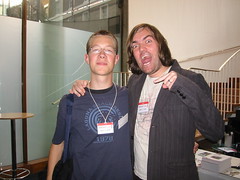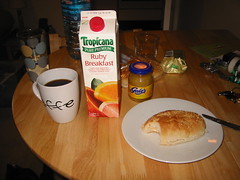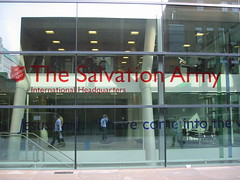Writing another general and full review of RailsConf Europe would not only fail to be complete, but also repeat a lot of work others already did very well. I’d recommend you to read Planet RubyOnRails and will continue with my personal remarks now.
My last dabbling with Rails already has been over a half year ago, and in the mean time a lot of things changed. Not only Rails overall got better—especially the changes in the development trunk and the new RESTful stuff as presented in DHH’s keynote give me a warm and cozy feeling—, I also got a far better understanding of Rails. It appears as if I’m converging to Rails, and Rails converges to me; but I can’t tell how fast this happens or when we are near enough for both of us to stay comfortable. I think it will happen earlier than I think. (If you ever plan to hire me for writing English, please forget about this paragraph.)
In the end, it comes down to this: There are decisions done in Rails that I don’t agree with. But if I just suck it down, the reward will be far bigger than the price: You get a great community that contains a lot of top-notch people involved around building the web. You get a lot of convenience, you’ll never have to redo the same boring stuff again. (Even if I’d write my own framework, I’d at least have to do them once.) And, when you understood the relevant parts, due to the power of Ruby, you still can fix what you want, then. Dave Thomas told in his keynote the paradox of “You can’t possibly use something before it’s being used.” My problem is more along “You can’t possibly grok something before you grok it.” Or “You can’t possibly fix something before you know how it’s broken it.” But can taste be “broken”? Is it even taste, or is it a well-informed design decision?
I’ll be using Rails for my next web project; parts of it already are done and I think they can be integrated easily. I want to use it. And I know I probably won’t get it right the first time. And I’ll retry. And I’ll see how I get along with Rails, and if it (still?) doesn’t work for me, I’ll just do it my way. That will be quite some more work, in the end, so I’d really like to avoid that happening.
Last, but not the least, I’d like to thank all the people that made RailsConf possible and as great as it was—not only the people that organized the conf or gave excellent talks; but also everyone I talked to, let me stay in their flat or even actually invited me to come there. They know who they are, and I’m really very thankful for everything they did.
There is one more index card I’d like to post last, even if it’s actually been written first.
Interesting things you see when taking the coach:
- a Polish car
- a dead bird
- another, 1, 2, 3
- the coach actually takes longer than the flight
- a gluestick
- a banana skin
- an orange skin
- arcane camera logos
NP: Johnny Cash—Highwayman





